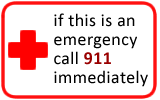Earache
Earache
Does this describe your symptoms? |
Definition
Causes of Earache
|
If not, see these topics
|
When to Call Your Doctor |
Call Your Doctor Now (night or day) If |
|
|
|
Call Your Doctor Within 24 Hours (between 9 am and 4 pm) If |
|
|
|
Self Care at Home If |
|
|
HOME CARE ADVICE FOR EARACHE |
Pain Medicines:
For pain relief, take acetaminophen, ibuprofen, or naproxen.
Acetaminophen (e.g., Tylenol):
Take 650 mg by mouth every 4-6 hours. Each Regular Strength Tylenol pill has 325 mg of acetaminophen.
Another choice is to take 1,000 mg every 8 hours. Each Extra Strength Tylenol pill has 500 mg of acetaminophen.
The most you should take each day is 3,000 mg.
Ibuprofen (e.g., Motrin, Advil):
Take 400 mg by mouth every 6 hours.
Another choice is to take 600 mg by mouth every 8 hours.
Use the lowest amount that makes your pain feel better.
Naproxen (e.g., Aleve):
Take 250-500 mg by mouth every 12 hours.
Use the lowest amount that makes your pain feel better.
Extra Notes:
Acetaminophen is thought to be safer than ibuprofen or naproxen in people over 65 years old. Acetaminophen is in many OTC and prescription medicines. It might be in more than one medicine that you are taking. You need to be careful and not take an overdose. An acetaminophen overdose can hurt the liver.
Caution: Do not take acetaminophen if you have liver disease.
Caution: Do not take ibuprofen or naproxen if you have stomach problems, kidney disease, are pregnant, or have been told by your doctor to avoid this type of medicine. Do not take ibuprofen or naproxen for more than 7 days without consulting your doctor.
Before taking any medicine, read all the instructions on the package
Local Cold for Pain: Apply a cold pack or a cold wet washcloth to the outer ear for 20 minutes to reduce pain while the pain medicine takes effect (Note: Some individuals prefer local heat instead of cold for 20 minutes).
Avoid Earplugs: If pus or cloudy fluid is draining from the ear canal, wipe the pus away as it appears. Avoid plugging with cotton (Reason: retained pus causes irritation or infection of the ear canal).
Contagiousness: Ear infections are not contagious.
Earache during Air Travel: Ear pain and stuffiness can occur during air travel. This results from too rapid changes in air pressure.
Treatment - Earache During Air Travel: There are a number of different maneuvers that you can use to reduce the pressure and pain, including yawning, chewing gum, or swallowing. You can also try to exhale while pinching your nose and keeping your lips closed.
Prevention of Earache During Air Travel: Using a nasal decongestant approximately one hour before take-off can sometimes help. Decongestants shrink the swollen nasal passages and open up the tube connecting the nose and the ear (eustachian) to help normalize ear pressure. They can be taken as pills by mouth or as a nasal spray.
Pseudophedrine (Sudafed): Available over-the-counter in pill form. Typical adult dosage is two 30 mg tablets every 6 hours.
Phenylephrine nasal drops (Neo-Synephrine): Available over-the-counter. Clean out the nose before using. Spray each nostril once, wait one minute for absorption, and then spray a second time. Read package instructions.
Do not take these medications if you have high blood pressure, heart disease or prostate enlargement. Do not use these medications for more than 3 days (Reason: excessive use can cause rebound nasal congestion).
Read the package instructions thoroughly on all medications that you take.
Call Your Doctor If:
You become worse
And remember, contact your doctor if you develop any of the "Call Your Doctor" symptoms.
Updated:
March 22, 2017



